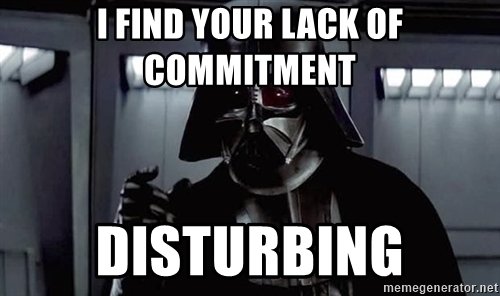The Power of Commitment

At the turn of a new year, many people like to take time to reflect on the past and plan for the future. That arbitrary delineation of time gets people thinking about starting fresh; starting off the new year in a way as to make it better than the last.
That sentiment is admirable and I'd never discourage anyone from taking the time to perform a thoughtful assessment of their lives and make controlled changes for the better. What better way than to make a new year's resolution?

This year, I'll do that thing that I've always wanted to do!
I'll change so that I achieve that one thing I've always wanted to achieve, but never got around to it!
I started strong last year, but faded off. Not this time!
So here we are, two full months in to 2018.
How're your resolutions coming along?
If you're still on them, that's great. Keep it up! If you've begun to fade or have somehow allowed them to lapse, keep reading. (Actually, no matter who you are, please keep reading. There are more words! And maybe pictures!)
So, why do some resolutions fail? Let's take a look at an example, which I may or may not have attempted to do at one point in time.
This year, I want to get in shape.
That's great! So... how do you get in shape? Go to the gym, of course!
So you get a great deal on a gym membership. You know where it is because you pass by it all the time saying Yeah, I should get in shape, but never stop because, well, you're busy with other things.
Now you know you. You know that while you have all this gusto now, you may not have it at 5am that one morning or after a grueling day at work. Failing to plan is planning to fail, you say.
So how do you solve that problem? Get some equipment! If you have equipment at home, there's no excuse, right?
So after you get your gym membership (which you'll start going on Monday, because today's Friday and there's weekend things to do), you head on over to the sports store (or Amazon app) and get some equipment.
Now you're ready to go. Monday rolls around and you do it: you go to the gym and do gym things.

You skip Tuesday because you're on a Monday, Wednesday, Friday thing. Wednesday is fine and then that first Friday hits. Last minute work meeting -- happy hour -- scheduled right over your gym time.
I've been good this week. I'll use Saturday as a makeup day. It's fine.
Saturday comes around and it's raining. No one likes driving in that, not on these roads. So you pull up a routine on your phone and use your new equipment. You pat yourself on the back: you knew it would come in handy.
Getting this stuff was genius!
You stick faithfully to the plan for a couple of weeks, but you're not "in shape" yet. Or if you are, you certainly don't feel it. So you miss a day due to other things. I'll work harder the next time to make up for it.
You go on vacation and miss a whole week.
You come back and it's tough to get back into the routine again, but you do it anyway. Days are missed here and there, until you're out with one of your friends and they ask, How's the workout thing going?
Oh, I've been pretty busy with the vacation and getting back to work. I'll pick it back up later when I have some time.
But, you never really do. Life gets in the way: family events, work, the weekend. There's always something. Your equipment begins to collect dust and your continues to dutifully charge your credit card every month.
And just like that, the year is over.
A new year already? What happened. This new year, I'll do it. I've already got my membership and equipment. This year will be different.
Or will it?
Measuring Commitment
Let's take that common, admirable goal we used as an example:
This year, I want to get in shape.
Is this really a goal? What does in shape really mean and how do we know when we achieve that? Can you commit to simply getting in shape?
The short answer is: Not really.
There is a distinct lack of measurable progress from not in shape to in shape. And, in general, people are very much attuned to having a sense of tangible progress to drive them forward:
- We've seen marathoners literally crawl their way to the finish line because they know they're progressing to a goal: they can see it, feel it, and reach it.
- Companies set goals with checkpoints to provide a sanity check to see if their goal is still achievable and make adjustments as necessary.
- For some, seeing the clock tick down to "quitting time" is a goal that can be measured throughout the day. 2:00pm... I can hang on for another 3 hours!
And the best part of seeing tangible progress? It's easier to commit to objective. You have feedback and know whether you can make it or not and, more importantly, know what more it'll take to get there.
If your progress is difficult to measure, it's natural for interest to wane or stay consistent. It's harder to tell what's working and what's not. How would you even know if the hard work you're putting in is even doing any good? And if it's difficult to tell how -- if -- your hard work is paying off, how can you commit to continue what could be a fruitless endeavor?
This is no different when developing software.
Companies can easily fall into the same trap by defining unclear goals and attempting to commit to a cause that is difficult to measure.
Companies that are able to identify clear, measurable, and attainable goals, enable their employees to fully commit to the cause and, in turn, provides the company a specific means to fully commit to their employees.
Keep in mind, the definition of a goal is only the first step. Committing to achieving the goal is where the rubber meets the road.
If we take the previous example and apply it to software, you may find some clear and distinct parallels.
Instead of "getting in shape", we're going to replace the company's widget system. That goal is pretty straightforward, right? If you have a new widget system at the end of the day, you've achieved success!
To be fair, the old widget system needs to go. It's old, difficult to work with, and requires workarounds out the wazoo.
The company puts all of their resources behind replacing the old widget system.
The new one is better!
It'll eliminate the workarounds and increase productivity!
We'll modernize our toolset, making us an industry leader!
Another proclamation with an exclamation point!
As the replacement effort moves forward, problems and issues arise, just as they always do in software implementation efforts. Those concerns are heard and the appropriate pivots made, the trumpets continuing to sound: replace the widget system!
Eventually, questions are asked. What are we trying to achieve with
There isn't a clear enough answer, other than replace the widget system!
Everyone forges ahead.
More time goes by and issues that arise are resolved with the premise of replace the widget system! This often translates into just make it work.
Commitment wanes and shifts to simply meeting the objective by making things work. The new widget system is going in, no matter what. Slap some code in there, introduce a "Day 1" workaround there, and you'll get something up and running.
Once the dust settles from the implementation (that was, hopefully, completed), the company can say that the goal was met. The new widget system is in place. But what was solved?
After some time, did the costs justify the implementation? Has the new technology provided the intended benefit? And the horror of horrors: is the old widget system still around for the foreseeable future with no end in sight?
It's possible that while zeroing in on the objective, decisions were made that could adversely affect some of the benefits that were expected of the new widget system:
- Accumulation of technical debt, while sometimes unavoidable (to varying degrees), could make future changes more difficult or require additional maintenance than previously expected.
- Workarounds may be developed as a "temporary" measure in order for the new widget system to perform a necessary capability that the old widget system had.
- And worst of all: the effort to replace the old widget system may halt or never even start because of an unclear goal that leads to a lack of commitment throughout the organization.

Committing is Achieving
Commitment to an activity, an idea, or a philosophy is predicated around a simple premise: it's what you make time for.
Everything else aside, if you're committed to something, you'll make time doing what you feel is necessary to make progress either directly (e.g. typing on the keyboard) or indirectly (e.g. going out of your way to provide encouragement in a group setting).
We've achieved amazing things as human beings when you look at what we've done when we've committed to something:
- There's a space station orbiting our planet with people living inside of it.
- You can use your phone to discover and purchase something that can be at your house in 2 days.
- And that weird friend you had in high school that skipped class, ate glue, and dressed as the school mascot for prom? The one that caused you to worry because you noticed they had kids on Facebook? They turned out to be amazing parent, by committing to their kids.
Efforts that require the commitment of several people and/or organizations to require the same level of commitment from everyone in the group, which makes communication and trust paramount to success.
Individuals focused on particular tasks must know that those they are working with and/or for are just as committed to the success of the endeavor as they are, which is inclusive of the entire management chain.
Now, there is still time to change and adapt any new year's resolutions you have or any particular goals that you're striving to achieve.
Make your goals specific, so...
- ...instead of getting in shape you'll shoot for running 20 minutes without stopping.
- ...instead of implementing the widget system you'll reduce manual workarounds by 20% and reduce the administrative budget surrounding widget creation and maintenance by 10%.
- ...instead of waiting until the beginning of a new week to try something new, start now.
Commitment is a powerful tool that you have full control over. Take advantage of it.
